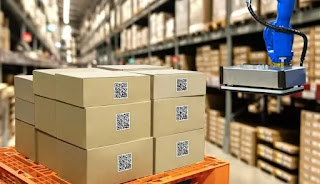As the use of information technology, data and analytics increases, so does the integration of all advanced product manufacturing strategies. And through this another industrial revolution is happening. As a result, those who are in charge of production in various industries are bringing innovation in their products by integrating information technology.
Article index:
When the Industrial Internet of Things (IIOT), known as "Industry 4.0", is applied to the manufacturing industry, it is actually a combination of smart manufacturing equipment, artificial intelligence (AI)-driven automation and advanced analytics technology. Through which every worker and factory is made more efficient and productive.
.
What is a smart factory?
For those who are involved in product production, Smart Factory can be helpful for them to improve performance in this dynamic digital world. A smart factory is basically an environment in which the various working processes of a factory are monitored through cyber-physical systems. It analyzes various data, controls working methods and automates decision making. As a result, efficiency and effectiveness in product production also improved.
In a smart factory, factory managers can get various benefits in managing their operations. So the interest in smart factory is increasing day by day to stay ahead in this competitive market. Some of the notable advantages of Smart Factory are:
Advantage Convenience of real-time round-the-clock surveillance across production chains
ব্যবহার Use of information and technology to improve action process control
Flexibility at work, ease of adapting to new situations and being more active in production
Directly Direct coordination between customer and supplier
.
Industry 4.0 brings innovation, automation and excellence in operations
Your shop floor is the key to making a profit in business. And this is also the central issue in the case of smart factories. "Industry 4.0" brings new technologies that enable faster automation, adjustments to data analysis, and make it easier to operate on the shop floor.
In this way, the manufacturers can use their maximum skills. Let's take a look at the key technologies that will be used in Industry 4.0:
Big data and data analysis
Geotagging and Geographic Information System (GIS)
AI or artificial intelligence
Cloud computing and ‘Everything as a Service’ (XaaS)
Robotic Process Automation (RPA)
Blockchain
Remote Sensor and Internet of Things (IoT)
Drones and automatic aviation (UAS)
.
Advantages of using technology in smart factories
Businesses can reap many benefits through the implementation of smart factory technology. Such as:
Production Production of advanced, fast and affordable products
Availability of demand-oriented products including small size production
Customized design, materials and delivery
Advantage The convenience of identifying every part of the product, including components and materials
Opportunity Opportunities to improve product production as well as improve service and customer experience
Keep Maintain cyber security as a key quality or feature of the manufacturing process and the product produced
.
The next factory will run through technology and digital enterprise
All the groundbreaking digital technologies have evolved rapidly in the last few years. At the same time, those technologies have changed dramatically. Behind which the driving force is basically progress in 3 areas. These include reducing the cost of computing, storage and bandwidth usage.
Currently, the focus of business is data, the source, volume and complexity of which is increasing day by day. As a result, product manufacturers have no choice but to implement digital enterprise applications by integrating with cloud and hybrid infrastructure.
There will also be an increase in the use of more smart strategies and new, centralized and AI-driven operations (AIOPS) systems in place of conventional IT operations in modern management in the future. This will increase fluency, customer focus and efficiency in institutional work. In this way, the ideal business organization of the future will be formed, where the work will be done by coordinating the instruments with the people, not by excluding the people.
#Technology #smart_factory #future

